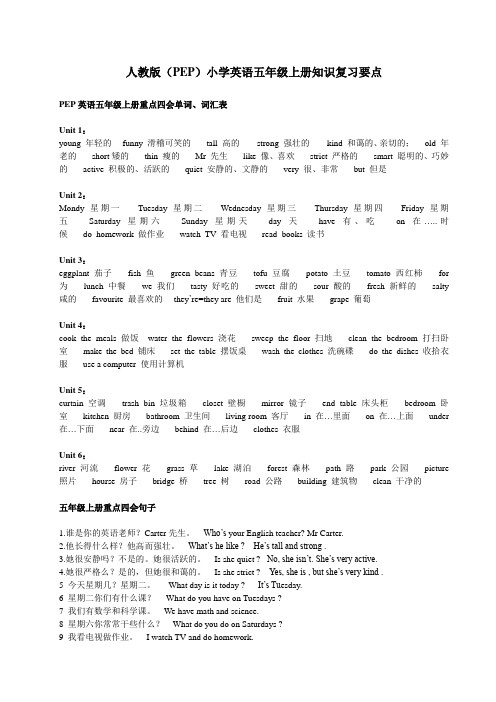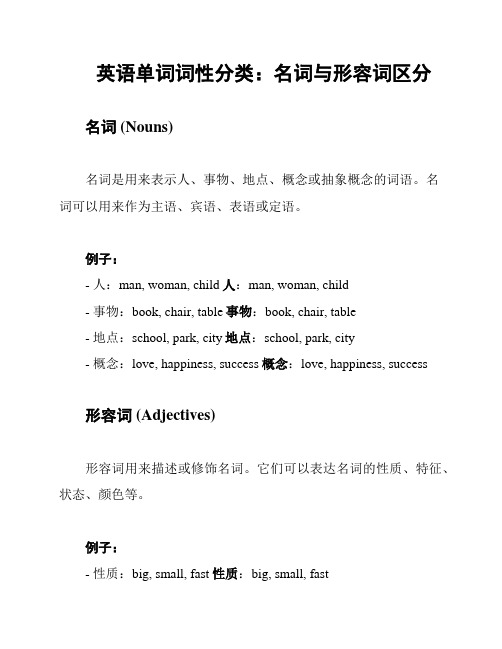funny名词
河南省七年级英语上册Unit6Doyoulikebananas总结(重点)超详细

河南省七年级英语上册Unit6Doyoulikebananas总结(重点)超详细单选题1、Hurry up!Some _____ and ____ are on sale in the supermarket.A.tomato; eggB.tomatoes; eggC.tomatoes; eggsD.tomato; eggs答案:C句意:快点!超市里一些西红柿和鸡蛋在降价销售。
tomato西红柿,可数名词单数;tomatoes是复数形式;egg 鸡蛋,单数;eggs是复数形式。
空前的some意思是“一些”,修饰可数名词复数,两个空都要用复数形式,故应选C。
2、Sandy really likes eating meat, but she doesn't like eating________. A.breadsB.vegetablesC.chickens答案:B句意:桑迪真的很喜欢吃肉,但是她不喜欢吃蔬菜。
考查名词。
bread面包,不可数名词,不加s。
vegetables蔬菜,可数名词,通常用复数形式。
chicken鸡肉,不可数名词;chicken如果加s变复数,表达的意思是“小鸡”。
根据“likes eating meat, but she doesn't like”后面句子是转折,表达“喜欢吃肉但是不喜欢吃蔬菜”。
故选B。
3、—Mr.Smith, can I ask you a ? I can’t find the answer.—Yes. What is it?A.questionB.habitC.nameD.number答案:A句意:——史密斯先生,我能问你一个问题吗?我找不到答案。
——好的。
它是什么?考查名词辨析。
question问题;habit习惯;name名字;number数字。
根据下文“我找不到答案”可知上句是:我能问你一个问题吗?故选A。
4、How much ________ do we need to make a banana milk shake? A.bananasB.applesC.coffeeD.milk答案:D句意:做香蕉奶昔需要多少牛奶?考查名词。
U4T1八上英语仁爱版重点单词

U4T1八上英语仁爱版重点单词Unit 4 Topic 1 (U4T1) 是八年级上学期英语课程中的一个重要主题。
在这个主题中,学生将学习和运用一些关键的单词来描述人物特征、外貌和个性,以及人际关系。
下面是U4T1 的重点单词。
1. appearance 出现;外貌- 形容词:appear 出现的;外貌上的- 例句:Her striking appearance made her stand out in the crowd.(她引人注目的外貌使她在人群中脱颖而出。
)2. personality 个性;人格- 形容词:personality 有个性的;鲜明的- 例句:John has a friendly personality and always gets along well with others.(约翰个性友好,总是能与他人相处融洽。
)3. responsible 负责任的;可靠的- 名词:responsibility 责任- 例句:As the class monitor, he is responsible for organizing class activities.(作为班长,他负责组织班级活动。
)4. confident 自信的;有信心的- 名词:confidence 自信- 例句:She is confident that she can win the competition.(她有信心能赢得比赛。
)5. patient 耐心的;有耐心的- 名词:patience 耐心- 例句:The teacher was patient and helped the student understand the difficult math problem.(老师很有耐心,帮助学生理解难题。
)6. polite 有礼貌的;客气的- 名词:politeness 有礼貌- 例句:It's important to be polite and say "please" and "thank you".(有礼貌地说“请”和“谢谢”是很重要的。
人教版(PEP)小学英语五年级上册知识复习要点

人教版(PEP)小学英语五年级上册知识复习要点PEP英语五年级上册重点四会单词、词汇表Unit 1:young 年轻的 funny 滑稽可笑的 tall 高的 strong 强壮的kind 和蔼的、亲切的;old 年老的short矮的thin 瘦的Mr 先生like 像、喜欢strict 严格的smart 聪明的、巧妙的active 积极的、活跃的quiet 安静的、文静的very 很、非常but 但是Unit 2:Mondy 星期一Tuesday 星期二Wednesday 星期三Thursday 星期四Friday 星期五Saturday 星期六Sunday 星期天day 天have 有、吃on 在…..时候do homework 做作业watch TV 看电视read books 读书Unit 3:eggplant 茄子fish 鱼green beans 青豆tofu 豆腐potato 土豆tomato 西红柿for 为lunch 中餐we 我们tasty 好吃的sweet 甜的sour 酸的fresh 新鲜的salty 咸的favourite 最喜欢的 they’re=they are 他们是fruit 水果grape 葡萄Unit 4:cook the meals 做饭water the flowers 浇花sweep the floor 扫地clean the bedroom 打扫卧室make the bed 铺床set the table 摆饭桌wash the clothes 洗碗碟do the dishes 收拾衣服use a computer 使用计算机Unit 5:curtain 空调trash bin 垃圾箱closet 壁橱mirror 镜子end table 床头柜bedroom 卧室kitchen 厨房bathroom 卫生间living room 客厅in 在…里面on 在…上面under 在…下面near 在..旁边behind 在…后边clothes 衣服Unit 6:river 河流flower 花grass 草lake 湖泊forest 森林path 路park 公园picture 照片hourse 房子bridge 桥tree 树road 公路building 建筑物clean 干净的五年级上册重点四会句子1.谁是你的英语老师?Carter先生。
英语单词词性分类:名词与形容词区分

英语单词词性分类:名词与形容词区分名词 (Nouns)名词是用来表示人、事物、地点、概念或抽象概念的词语。
名词可以用来作为主语、宾语、表语或定语。
例子:- 人:man, woman, child人:man, woman, child- 事物:book, chair, table事物:book, chair, table- 地点:school, park, city地点:school, park, city- 概念:love, happiness, success概念:love, happiness, success形容词 (Adjectives)形容词用来描述或修饰名词。
它们可以表达名词的性质、特征、状态、颜色等。
例子:- 性质:big, small, fast性质:big, small, fast- 特征:beautiful, intelligent, funny特征:beautiful, intelligent, funny- 状态:happy, sad, tired状态:happy, sad, tired- 颜色:red, blue, green颜色:red, blue, green区别名词和形容词的主要区别在于它们在句子中的作用和功能。
名词通常用来指代事物或代表概念,而形容词则用来描述或修饰名词。
例子:- 名词作为主语:The cat is sleeping.(猫在睡觉。
)The cat is sleeping.(猫在睡觉。
)- 形容词修饰名词:The big cat is sleeping.(大猫在睡觉。
)big cat is sleeping.(大猫在睡觉。
)请注意,在句子中使用名称和描述时,需要根据上下文的语境和句子结构来确定正确的词性。
总结名词和形容词都是英语中常见的词性,它们有不同的作用和功能。
名词用来代表人、事物、地点和概念,而形容词则用来描述或修饰名词。
了解这些词性的区别对于正确使用和理解英语单词至关重要。
名词与形容词的转换规则

名词与形容词的转换规则一、名词加后缀构成形容词1、名词加后缀-en构成形容词例如:名词gold+后缀en=形容词golden (金色的)名词wood+后缀en=形容词wooden (木制的)名词wool+后缀en=形容词woolen (羊毛的)2、名词加后缀-al构成形容词例如:名词music+后缀al=musical(音乐的)名词nation+后缀al=形容词national (国家的)名词nature+后缀al=形容词natural(天然的)名词person+后缀al=形容词personal(个人的)3、名词加后缀-y构成形容词例如:名词cloud+后缀y=形容词cloudy(多云的)名词sun+后缀y=形容词sunny(晴朗的)名词fun+后缀y=形容词funny (有趣的)名词wind+后缀y=形容词windy(有风的)名词snow+后缀y=形容词snowy(下雪的)名词rain+后缀y=形容词rainy(下雨的)4、名词加后缀-ish构成形容词例如:名词child+后缀ish=形容词childish(孩子般的)名词self+后缀ish=形容词selfish(自私的)名词fool+后缀ish=形容词foolish(愚蠢的)5、名词加后缀-ive构成形容词例如:名词act+后缀ive=形容词active(积极的)名词impress+后缀ive=形容词impressive(印象深刻的)名词expense+后缀ive=形容词expensive(昂贵的)名词excess+后缀ive=形容词excessive(过多的)6、名词加后缀-ful构成形容词例如:名词help+后缀ful=形容词helpful(有帮助的)名词use+后缀ful=形容词useful(有用的)名词peace+后缀ful=形容词peaceful(和平的)名词beauty+后缀ful=形容词beautiful(美丽的)名词power+后缀ful=形容词powerful(强有力的)名词faith+后缀ful=形容词faithful(忠诚的)名词care+后缀ful=形容词careful(小心的)名词law+后缀ful=形容词lawful(合法的)7、名词加后缀-ous构成形容词例如:名词adventure+后缀ous=形容词adventurous(危险的)名词danger+后缀ous=形容词dangerous(危险的)名词fame+后缀ous=形容词famous(著名的)名词envy+后缀ous=形容词envious(羡慕的)名词virtue+后缀ous=形容词virtuous(有德行的)8、名词加后缀-ly构成形容词例如:名词order+后缀ly=形容词orderly(有秩序的)名词time+后缀ly=形容词timely(及时的)名词month+后缀ly=形容词monthly(每月的)名词day+后缀ly=形容词daily(每天的)名词cost+后缀ly=形容词costly(昂贵的)名词father+后缀ly=形容词fatherly(父亲般的)名词love+后缀ly=形容词lovely(可爱的)名词man+后缀ly=形容词manly(有男子汉气概的)名词hour+后缀ly=形容词hourly(每小时的)名词friend+后缀ly=形容词friendly(友好的)名词elder+后缀ly=形容词elderly(年老的)名词week+后缀ly=形容词weekly(每周的)9、名词加后缀-less构成形容词例如:名词care+后缀less=形容词careless(粗心的)名词hope+后缀less=形容词hopeless(没有希望的)名词fear+后缀less=形容词fearless(无畏的)名词limit+后缀less=形容词limitless(无限的)名词help+后缀less=形容词helpless(无助的)名词use+后缀less=形容词useless(无用的)名词aim+后缀less=形容词aimless(无目的)二、名词复合形容词1、名词加分词构成形容词名词man+分词made=形容词man-made(人造的)名词hand+分词made=形容词hand-made(手工的)名词state+分词owned=形容词state-owned(国有的)名词work+分词related=形容词work-related(与工作相关的)名词peace+分词loving=形容词peace-loving(爱好和平的)名词family+分词planning=形容词family-planning(计划生育的)名词labor+分词saving=形容词labor-saving(节省劳力的)名词money+分词raising=形容词money-raising(集资的)名词problem+分词solving=形容词problem-solving(解决问题的)2、名词加形容词构成形容词名词world+形容词famous=形容词world-famous(举世闻名的)名词world+形容词wide=形容词world-wide(全球的)名词ice+形容词cold=形容词ice-cold(冰冷的)名词snow+形容词white=形容词snow-white(雪白的)3、数词加名词构成形容词数词987+名词metre=形容词987-metre(987米的)数词four+名词month=形容词four-month(四个月的)数词seven+名词day=形容词seven-day(7天的)数词first+名词hand=形容词first-hand(第一手的)数词three+名词week=形容词three-week(三周的)。
五年级英语上册重要知识点整理(1-2单元)

五年级英语上册重要知识点整理(1-2单元)第一单元:、以字母y结尾的名词变复数,如果字母y的前面是元音(a,e,i,o,u),就在y后面直接加s。
如:boy—boys.如果字母y前面是辅音,则把y变为i,再加es.如:lady —ladies city—citiesstory--stories.2、动词的第三人称单数:(所谓第三人称单数,就是指既不是你也不是我的另外一个人,可以是具体的人名,他,她,或它,也可以是称呼类,如mymother,myfriend等。
当一个句子中的人物是第三人称单数,并且这个句子又是一般现在时态时,该句子中的动词要使用第三人称单数形式。
)have—haslike—likesdo—doesgo—goes watch--watches3、词语变化:fun――funnyfunny(名词形式)――fun know――nohe---him反义词:tall—shortlong—shortyoung—oldnew—oldstrong—thinfat—thinkind—strictactive—quiet4、belike与dolike:在本单元中,what’s…like?的句型是主句型,这里的like是“像…一样”的意思.what’s…like?是问某某长得什么样子,同学们千万别和like的另一个意思“喜欢”相混了。
它的答语一般用:He/She/Itis…,如:what’syourfatherlike?你爸爸长得什么样子?。
而在dolike的句子中,like的意思才是“喜欢”的意思。
如:whatdoesyourfatherlike?你爸爸喜欢什么?第二单元:、当询问别人喜欢哪些课程时,classes应当用复数形式,因为别人喜欢的课程可能不止一门。
whatclassesdoyoulike?你喜欢哪门课程?2、表示星期几的七个单词,开头第一个字母都要大写。
其简写形式为前三个字母加点。
week星期,周。
五年级上册英语单词复数
五年级上册英语单词复数一、Unit 1。
1. old - olds [əʊldz] (名词复数)2. young - youngs [jʌŋz] (名词复数)3. funny - funnies [ˈfʌniz] (形容词复数)4. kind - kinds [kaɪndz] (名词复数)5. strict - strictes [strɪkts] (形容词复数)6. polite - polites [pəˈlaɪts] (形容词复数)7. hard - hards [hɑːdz] (形容词复数)8. helpful - helpfuls [ˈhelpflz] (形容词复数)9. clever - cleveres [ˈklevəz] (形容词复数)二、Unit 2。
1. Monday - Mondays [ˈmʌndeɪz] (名词复数)2. Tuesday - Tuesdays [ˈtjuːzdeɪz] (名词复数)3. Wednesday - Wednesdays [ˈwenzdeɪz] (名词复数)4. Thursday - Thursdays [ˈθɜːzdeɪz] (名词复数)5. Friday - Fridays [ˈfraɪdeɪz] (名词复数)6. Saturday - Saturdays [ˈsætədeɪz] (名词复数)7. Sunday - Sundays [ˈsʌndeɪz] (名词复数)8. weekend - weekends [ˌwiːkˈendz] (名词复数)三、Unit 3。
1. sandwich - sandwiches [ˈsænwɪtʃɪz] (名词复数)2. salad - salads [ˈsælədz] (名词复数)3. hamburger - hamburgers [ˈhæmbɜːɡəz] (名词复数)4. ice cream - ice creams [aɪs kriːmz] (名词复数)5. tea - teas [tiːz] (名词复数)四、Unit 4。
名词与形容词的转换规则
名词与形容词的转换规则名词与形容词之间的转换规则主要有以下几种:1. 在名词后面加-y可以变成形容词,尤其是一些与天气有关的名词。
例如,“rain”变为“rainy”,“cloud”变为“cloudy”,“wind”变为“windy”,“snow”变为“snowy”,“health”变为“healthy”,“luck”变为“lucky”等。
需要注意的是,如果名词以重读闭音节结尾,且词尾只有一个辅音字母,这时应双写词尾的辅音字母再加-y,如“sun”变为“sunny”,“fun”变为“funny”等。
另外,少数以不发音的e结尾的名词变为形容词时,应去掉e再加-y,例如“noise”变为“noisy”,“ice”变为“icy”等。
2. 在名词后加-less构成含有否定意义的形容词。
例如,“care”变为“careless”,“use”变为“useless”,“hope”变为“hopeless”等。
3. 在名词后加-ly变为形容词。
例如,“friend”变为“friendly”,“love”变为“lovely”,“man”变为“manly”等。
4. 在名词后加-ous变为形容词。
例如,“danger”变为“dangerous”,“fame”变为“famous”,“mystery”变为“mysterious”等。
5. 在名词后面加-al变为形容词。
例如,“music”变为“musical”,“nation”变为“national”,“person”变为“personal”等。
需要注意的是,这些规则并非绝对,有些名词可能无法按照这些规则转换为形容词。
此外,转换后的形容词的意义可能与原名词的意义有所不同,需要根据具体语境进行理解。
七年级下册Unit 2 人教版英语中考一轮复习(词汇+语法讲解)
一轮复习:七下U2 词汇+语法讲解【单词默写】【单词变形】【单词变性】funny形容词变名词_____________ quickly副词变形容词_____________ usually 副词变形容词_____________ life名词变动词_____________clean动词变名词_____________run动词变名词_____________walk动词变名词_____________work动词变名词_____________【一词多义】1. either _______________ __________________I don’t know it, either.Either you or I can go to the cinema tonight.2. up ____________ _____________ _________________He is up there, on the top of the mountain.Mary has eaten up all the cake.After knowing the problem, Mary quickly thought up new ideas to solve it.3. dress _________________ _______________ _________________My mother sent me a dress on my fifteenth birthday.I can dress myself now.Mary is dressed in red today.4. quarter ______________ ____________It’s about a quarter to five now.One quarter of the students come from China.5. taste ___________ ____________The dish has a good taste, I want more.The dish tastes delicious.6. past ____________ ___________ _____________ _________________ It’s about five past five. The students my go home.I walked past a cafe yesterday.In the past, I used to be really shy.In the past few years, China has greatly changed.7. run ____________ ___________ ______________Mary runs quickly. She wants to be a runner.The boss decides to run a new shoe shop next year.Buses run from Hangzhou to Ningbo every thirty minutes.8. walk __________ _________ _______ _________________Mary likes to walk outside after supper.Mary is walking her dog now.Mary used to take a walk after supper.It’s about three minutes’ walk from my home to school.9. work ___________ __________ __________ _____________The machine doesn't work well.He works in a big factory.Mark Twain has many great works.Mary need some work to make money.10. exercise ____________ ______________ _____________ In school, we usually need do eye exercises on the third class. He exercises a lot every day to keep fit.You need to do exercise every day to keep fit.11. clean ___________ _______________After cleaning the classroom, students felt really tired.The classroom looks vvery clean.【词汇用法】1. clean: adj./sth. Is clean/v./clean sp./clean up/clean off2. either: adv./not…either/either…or3. taste: v./taste +adj./n./a good taste相关词辨析: sound vs. look vs. taste vs. smell vs. feel sound: sound+adj.look: look+adj.taste: taste+adj.smell: smell+adj.feel: feel+adj.4. dress: vt./dress oneself/dress sb./be dressed in/get dressed in近义词辨析: dress vs. put on vs. wear vs. be on vs. be indress: vt./dress oneself/dress sb./be dressed in/get dressed input on: vt./put on sth./表示动作wear: vt./ wear clothes/a necklace/a watch/a pair of glasses/a smile表示状态be on: sth. be on sb.be in: sb. be in sth.5. either: either…or/就近原则【攻占语法】副词(频度副词)1. 副词的分类: ______________ _____________ ______________ ______________2. 副词的位置: 频度副词放在______________ 和_______________ 的后面,______________的前面3. 频度副词的用法:0%100%_____________________________________________________________________________4. 频度的表达方式:一天三次_______________每隔四年__________________每隔一天_______________【词汇练习】1.The b ________ of the four seasons is spring while a year starts with January.2.Don’t forget to b ________ your teeth after meals.3.After getting d ________, he begins to wash his face and brush his teeth every morning.4.The e ________ kids learn to be independent, the better it is for their future.5.He has lived in Shanghai and Beijing, but he doesn't like e ________ of them.6. E ________ is really important for everyone and good for health.7.Our class is made up of f ________ students, twenty-two boys and twenty-eight girls.8.Mom is thirty-nine years old now and next year she will be f ________.9.My cousin Li Jing is the f ________ person I know. She always makes us laugh.10.Look at this g ________ of students playing beach volleyball. They are from Wenlan Middle school.11.—The apple is big and you can’t eat it all, John!—Then, let’s cut it into h ________.12.I don’t think the sixteen-year-olds should be allowed to have part-time j ________. They need time to dohomework.13.As a doctor, he saves lots of l ________ every year.14.Jack is getting fatter because he n ________ does sports in his free time.15.When summer comes, days become longer and n ________ become shorter.16.Rick sometimes plays tennis at six o ________.17.Joe was playing with a dog when I walked p ________ his small house.18.Do you have lunch at a q ________ past twelve?19.Cleaning the classroom is not difficult. If we do the work every day, we can finish it q ________.20.It's time for lunch. All the students are r________ out of the classroom, it is dangerous for them.21.After running, it feels so comfortable to take a s ________.22.My mother likes drinking tea, though s ________ she drinks coffee.23.There is a bus s ________ at the second crossing. You can wait the bus there.24.I really know some junk food is not good for my health, but it t ________ good!25.The apple pie is really t _______. I’d like one more.26.It’s a good habit to brush our t ________ twice a day.27.He stayed u ________ playing games on computer last night, which made him feel sleepy in class.28.I u ________ felt shy when I was young, but now, I am much more outgoing.29.Taking a w ________ after meals is a good habit.30.Reader Digest is a w____________ read magazine. People all over the world know it and love it.【参考答案】【单词变形】【单词变性】funny形容词变名词funquickly副词变形容词quickusually 副词变形容词usualylife名词变动词liveclean动词变名词cleanerrun动词变名词runnerwalk动词变名词walkerwork动词变名词works【一词多义】1. either 也要么I don’t know it, either.Either you or I can go to the cinema tonight.2. up 在上面结束想出He is up there, on the top of the mountain.Mary has eaten up all the cake.After knowing the problem, Mary quickly thought up new ideas to solve it.3. dress 女裙给某人穿衣服穿着My mother sent me a dress on my fifteenth birthday.I can dress myself now.Mary is dressed in red today.4. quarter 一刻钟25%It’s about a quarter to five now.One quarter of the students come from China.5. taste 味道尝起来The dish has a good taste, I want more.The dish tastes delicious.6. past 超过经过过去过去的It’s about five past five. The students my go home.I walked past a cafe yesterday.In the past, I used to be really shy.In the past few years, China has greatly changed.7. run 跑步经营运行Mary runs quickly. She wants to be a runner.The boss decides to run a new shoe shop next year. Buses run from Hangzhou to Ningbo every thirty minutes.8. walk 走路散步散步路程Mary likes to walk outside after supper.Mary is walking her dog now.Mary used to take a walk after supper.It’s about three minutes’ walk from my home to school.9. work 运行工作(v.) 著作工作(n.)The machine doesn't work well.He works in a big factory.Mark Twain has many great works.Mary need some work to make money.10. exercise 操锻炼(v.)锻炼(n.)In school, we usually need do eye exercises on the third class.He exercises a lot every day to keep fit.You need to do exercise every day to keep fit.11. clean 打扫干净的After cleaning the classroom, students felt really tired.The classroom looks vvery clean.1. 副词的分类: 频度副词修饰性副词连接性副词地点副词程度副词2. 副词的位置: 频度副词放在be动词和情态动词的后面,实义动词的前面3. 频度副词的用法:0%100%never hardly ever sometimes usually often frequently always4. 频度的表达方式:一天三次three times a day每隔四年every four years每隔一天every other day【词语练习】Best bring dressed earlier either exercise fifty forty funniest group halves jobs lives never nights o’clock past quarter quickly running shower sometimes stop tastes tasty up usually walk widely。
PEP小学英语五年级上册知识点第一、二单元
PEP小学英语五年级上册知识点(第一、二单元)PEP小学英语五年级上册知识点(第一、二单元)第一单元:1、以字母y结尾的名词变复数,如果字母y的前面是元音(au),就在y后面直接加s。
如:boy—boys. 如果字母y前面是辅音,则把y变为i, 再加es. 如:lady—ladies city—--2、动词的第三人称单数:(所谓第三人称单数,就是指既不是你也不是我的另外一个人,可以是具体的人名,他,她,或它,也可以是称呼类,如d等。
当一个句子中的人物是第三人称单数,并且这个句子又是一般现在时态时,该句子中的动词要使用第三人称单数形式。
)have—has like—likes do—does go—goeswatch--wa 3、词语变化:fun(形容词形式)――funny funny(名词形式)――fun know(同音词)――nohe(宾格形式)--- 反义词:tall—short long—ung—old new—old strong—thin fat—kind—strict active—qu 4、be like与do like: 在本单元中,What’s …like?的句型是主句型,这里的like是“像…一样”的意思. What’s …like?是问某某长得什么样子,同学们千万别和like的另一个意思“喜欢”相混了。
它的答语一般用:He/She/ It is…(后面跟描写人的外貌特征的词语),如:What’s your father like?你爸爸长得什么样子?。
而在do like的句子中,like的意思才是“喜欢”的意思。
如:What does your father like? 你爸爸喜欢什么?第二单元:1、当询问别人喜欢哪些课程时,classes应当用复数形式,因为别人喜欢的课程可能不止一门。
What classes do you like? 你喜欢哪门课程?2、表示星期几的七个单词,开头第一个字母都要大写。
